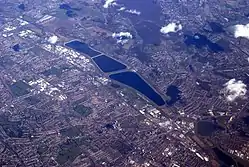Lee Valley Reservoir Chain
The Lee Valley Reservoir Chain is located in the Lee Valley, and comprises 13 reservoirs that supply drinking water to London.[1]

The Reservoir Chain is a major geographic constraint; together with the Thames it is one of the two significant topographic features that divide the capital and define the communities on either side. The Lower Lea Valley, downstream of the reservoirs, is more integrated, with better east–west transport connectivity.
Geographic significance
The Chain separates the London Boroughs of Haringey and Enfield to the west, from Waltham Forest and Essex in the east. The corridor includes 13 reservoirs, two to three channels of the Lee, as well as marshes and parkland, up to a mile wide.
During WWI, the settlements on both sides of the Upper Lea were badly hit by Germany Army and Navy airship raids. It is believed the crews mistook the Reservoir Chain for the Thames and released their bombs on what they took to be central London.[2]
The Boundary Commission treats the Thames and Lea as natural barriers within London. When reviewing the boundaries of London's parliamentary constituencies, it concludes that any constituency spanning either river would be artificial and not reflect local communities or identities. The 2018 review compromised on this, allowing a cross-Lea constituency further south, in the Lower Lea where the communities on each side are more integrated due to greater quantity and quality of the road and rail links across the valley.[3]
The corridor is part of the Metropolitan Green Belt and its national and international significance for wildlife is reflected by SSSI, Ramsar and SPA designations.[4] Lying between some of Londons's most densely populated areas, the Reservoir Chain and associated open land provides a highly valued ecological, landscape and recreational resource for the people of north and east London.
Reservoirs
The following waters are located in the London Borough of Enfield and are known collectively as the Chingford Reservoirs, which are a Site of Special Scientific Interest:[5]
The following waters, together known as the Walthamstow Reservoirs, are located in the London Borough of Waltham Forest and, with the exception of one, form a Site of Special Scientific Interest:[5][6]
- Lockwood Reservoir
- High Maynard Reservoir
- Low Maynard Reservoir
- East Warwick Reservoir
- West Warwick Reservoir
- Unnamed reservoirs numbered 1 to 5
- Banbury Reservoir (The only reservoir that is not part of a SSSI)
The reservoirs have the following characteristics:[7]
| Reservoir | Water Source (see below) | Water Supply | Depth, metres | Capacity, Ml |
|---|---|---|---|---|
| King George V | River Lea, New River, Lea Diversion | Pumped | 7.5 | 12,500 |
| William Girling | Lea Diversion | Pumped | 12.5 | 16,500 |
| Banbury | Lea Diversion & Thames-Lee tunnel | Pumped | 8.5 | 2,950 |
| Lockwood | Lea Diversion & Thames-Lee tunnel | Pumped | 10.4 | 2,500 |
| High Maynard | Lee Diversion, Walthamstow No. 4, East Warwick | Gravity-fed | 5.8 | 680 |
| Low Maynard | High Maynard | Gravity-fed | 3.0 | 150 |
| East Warwick | High Maynard, West Warwick | Gravity-fed | 5.8 | 960 |
| West Warwick | East Warwick | Gravity-fed | 5.8 | 800 |
| Walthamstow No. 4 | High Maynard, Walthamstow No. 5 | Gravity-fed | 5.8 | 590 |
| Walthamstow No. 5 | Walthamstow No. 4 | Gravity-fed | 5.8 | 770 |
Water supply
The reservoirs are fed by the following waters:
- River Lee Diversion
- River Lee Flood Relief Channel
- New River
- The Thames-Lee Water Main [8]
Water treatment
After being stored in the above reservoirs the water is piped to the Coppermills Water Treatment Works.[9]
References
- Reservoir information Archived 2011-01-24 at the Wayback Machine Retrieved November 9, 2007
- London 1914-17 The Zeppelin Menace, Ian Castle. Osprey Publishing 2008
- 2018 Boundary Commission proposals for parliamentary constituencies https://boundarycommissionforengland.independent.gov.uk/wp-content/uploads/2018/09/Final-recommendations-report.pdf
- Walthamstow Wetlands SSSI details includes reference to other designations https://designatedsites.naturalengland.org.uk/SiteGeneralDetail.aspx?SiteCode=UK9012111&SiteName=&countyCode=&responsiblePerson=&unitId=&SeaArea=&IFCAArea=
- "Lee Valley Regional Park Authority, Reservoirs". Archived from the original on 2010-03-09. Retrieved 2011-09-05.
- Natural England, Nature on the Map (Search on Walthamstow Reservoirs)
- https://web.archive.org/web/20110124142453/http://paginas.fe.up.pt/~mjneves/publicacoes_files/data/es/ponencias/por_autor/pdf/10109.pdf
- The Thames - Lee water main Retrieved September 13, 2008
- Coppermills Retrieved November 9, 2007